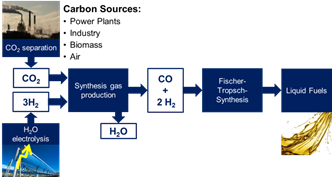
Ralph-Uwe Dietrich
German Aerospace Center (DLR), Germany, Stuttgart
Title: Synthetic jet fuel from renewable energy sources for sustainable aviation
Biography
Biography: Ralph-Uwe Dietrich
Abstract
Advanced technologies, optimized operation and infrastructure are not sufficient to achieve the CO2 mitigation goals agreed on for the aviation sector. Carbon neutral alternative liquid fuels are required to fill the gap towards a carbon-neutral growth from 2020 on. The Power-to-Liquid process is one option to produce synthetic jet fuels from renewable energy. The technical and economic performance of production processes based on renewable electricity and CO2 was investigated and evaluated.
Hydrogen can be generated by water electrolysis from fluctuating renewable power sources. Together with CO2 – e.g. sequestrated from industrial resources – the reverse water-gas-shift reaction forms syngas. The Fischer-Tropsch synthesis produces long chained hydrocarbons from syngas. Downstream product separation and upgrading generates gasoline, jet fuel and diesel. Another process concept is based on high temperature co-electrolysis of steam and CO2 producing synthesis gas at high temperature and pressure.
The process performance is evaluated via flowsheet simulation models and pinch point analyses comparing the Power-to-Fuel efficiency as well as carbon conversion into liquid fuels. A baseline Power-to-Fuel efficiency of 44 % for the concept based on water electrolysis can be increased to 60 % using the co-electrolysis concept. The baseline carbon conversion of 73 % grows to 98 %. The sensitivity of various operation conditions was analyzed.
A cost analysis based on market data and equipment factors was performed for the investment year 2014. Employing stationary power input of 105 €/MWh, production costs of 3.38 €/kg were found for the water electrolysis concept. The production costs of the co-electrolysis concept compare to 2.83 €/kg. The sensitivity of the electrolyzer capital cost and electricity prices were analyzed and their effect on the production costs will be presented.
Investment and operating costs to fill the gap towards carbon-neutral air transport growth from 2020 on can be predicted based on 2014 costs and technology status. A comparison to other renewable jet fuels regarding land use, feedstock potential and economic measures will be provided.

Recent Publications:
1. Albrecht F.G, König D.H, Baucks N, Dietrich, R.-U. (2017) A standardized methodology for the techno-economic evaluation of alternative fuels - A case study, Fuel (accepted for publication)
2. Albrecht F.G, Zhang J, Dietrich, R.-U. (2016) Process design and economic assessment of converting CO2 to liquid fuels. ACI's 7th Carbon Dioxide Utilization Summit 2016, 19.-20. Oct. 2016, Lyon, France.
3. Albrecht F.G, König D.H, Dietrich, R.-U. (2016) The potential of using power-to-liquid plants for power storage purposes. In: 2016 13th International Conference on the European Energy Market (EEM), S03_10163. 06.-09. Jun. 2016, Porto, Portugal. DOI: 10.1109/EEM.2016.7521203 ISBN 978-1-5090-1297-8.
4. König D.H, Albrecht F.G, Dietrich, R.-U. (2016) Power and Biomass-to-Liquid (PBtL): a Promising Approach to Produce Biofuels using Electricity. In: Papers of the 24th European Biomass Conference, 1074-1078. ETA-Florence Renewable Energies. 06.-09. Jun. 2016, Amsterdam, Netherland. DOI: 10.5071/24thEUBCE2016-3CO.7.3 ISBN 978-88-89407-165 ISSN 2282-5819
5. König D.H, Baucks N, Dietrich, R.-U., Wörner A (2015) Simulation and evaluation of a process concept for the generation of synthetic fuel from CO2 and H2. Energy, 91, Seiten 833-841. Elsevier. DOI: 10.1016/j.energy.2015.08.099 ISSN 0360-5442

